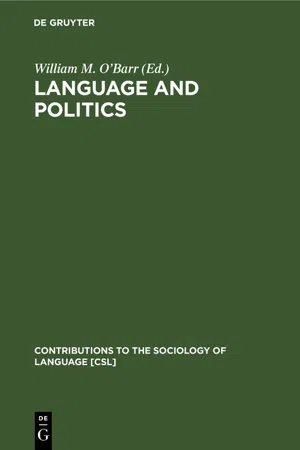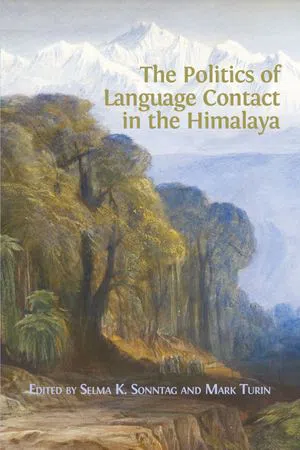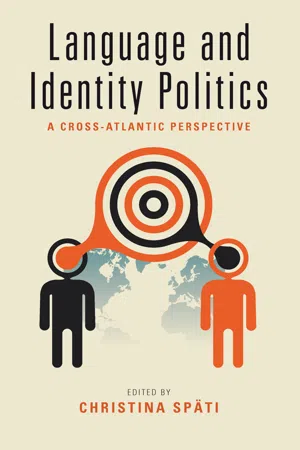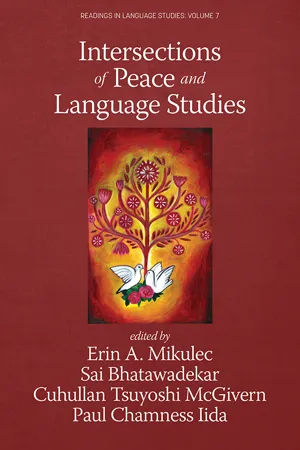Languages & Linguistics
Language and Politics
Language and politics examines the relationship between language and power, focusing on how language is used to shape and influence political discourse, policies, and ideologies. It explores how language can be a tool for political manipulation, identity construction, and resistance, and how political structures can impact language use and language rights. This field encompasses various aspects of language, including language policy, rhetoric, and the role of language in social movements.
Written by Perlego with AI-assistance
Related key terms
1 of 5
7 Key excerpts on "Language and Politics"
- eBook - PDF
- William M. O'Barr, William M. O’Barr(Authors)
- 2019(Publication Date)
- De Gruyter Mouton(Publisher)
Given the fact that so many variables about language can be manipulated, we can conclude that the relationship between Language and Politics is very rich one. Some of these relationships have already been studied in the area of language planning (i.e. the study of solutions to language problems by authorized government organi-zations). In the resolution of such problems, many political problems come to light and get attached to language problems. Indeed, deci-sions about language never seem to be simply related to mere communication problems but rather always to reflect other con-siderations. A discussion of this field and some of the political implications can be found in the recent volume edited by Rubin and Jernudd (1971). Many of the problems dealt with in this book relate to less formalized attention to language problems but which none-theless permit manipulation of the same aspects of language. By 404 Joan Rubin attention to those places where language is legislated about and those where it slips in unintentionally, we can gain a fuller idea of the relationship. Additionally, we will learn a great deal about the flexibility of language varieties and language attitudes. It is of great interest to sociolinguistics to explore the extent to which and cir-cumstances under which language variation is manipulable by socio-political interests. The study of the Language and Politics relationship can provide a clearer understanding of the basis for such manipula-tion. Sociolinguistics is just beginning to look at how language attitudes affect the entire communication process (cf. Shuy and Fasold 1973) and are manipulated for planning and development purposes. By looking at the language-politics relationship, sociolin-guists stand to gain greater understanding of this process. - Selma K. Sonntag(Author)
- 2019(Publication Date)
- Open Book Publishers(Publisher)
Introduction: Language Politics and Language Contact Selma K. Sonntag Language politics has always been inherently interdisciplinary, as highlighted by the range of disciplines contributing to and represented in the field — and linguistics and political science are not always the primary ones. The scope of the field is further enlarged by the two different ways that the phrase ‘language politics’ can be parsed: the language of politics versus the politics of language . The language of politics traces its contemporary roots to George Orwell’s celebrated and still relevant novel, 1984 . The study of the manipulation of politics and political attitudes through language, i.e., through choice of words, labels and metaphors as well as grammatical and syntactical structures (e.g., passive versus active voice), gained momentum beginning in the 1980s — appropriate timing given its Orwellian roots — when the linguist George Lakoff promoted the notion of ‘framing.’ How political issues are ‘framed’ often determines the parameters of political debate in the public sphere. Dalits throughout South Asia, including the Himalaya, raised their voice in the public sphere by rejecting Mahatma Gandhi’s paternalistic framing of them as Harijan and the more pejorative label of ‘Untouchables’ in favor of the agonistic term, ‘oppressed’ ( dalit ). The framing of local activity against big commercial logging in the Garhwal Himalaya in the 1970s as an environmental movement — the Chipko andolan — spread the now renowned ‘tree-hugging’ trope far beyond the western mountains of the Himalaya (Rangan 2000; DeLoach, Bruner © Selma K. Sonntag, CC BY 4.0 https://doi.org/10.11647/OBP.0169.07 2 The Politics of Language Contact in the Himalaya and Gossett 2002). In effect, Lakoff ignited the study of the language of politics in a number of disciplines, including enthusiasm for Critical Discourse Analysis (CDA) in linguistics.- eBook - PDF
Language and Identity Politics
A Cross-Atlantic Perspective
- Christina Späti(Author)
- 2015(Publication Date)
- Berghahn Books(Publisher)
It creates a web of social attachments and reciprocal commitments in which instru- The Politics of Linguistic Identity in Europe – 41 – mental causes and expressive concerns tend to become intermingled in inextricable ways. This intermingling sets the foundations for the powerful role that language plays in identity politics. From the angle of many minor-itized groups, struggling to overcome the subordinate institutional position of their vernacular is a critical factor for a self-categorization that is expe-rienced as a decisive step on the path leading towards self-determination, both at the individual and at the collective level. In my attempt to determine the main parameters of the politics of lin-guistic identity in Europe today, I begin by recapitulating how language be-came a crucial variable in the formation of nation-states. The subsequent step brings into focus the manifold connections that can be made out be-tween the politics of linguistic recognition and situations of diglossia, a concept coined to analyze settings in which two languages occupy hierar-chically separate functional domains in a given society. The final sections of this chapter are devoted to assessing the extent to which the current dynamics of Europeanization may be changing the frame of language poli-tics from both a minority and a majority perspective. Language and Nation-State Formation According to the estimates given by linguists, there are approximately 225 autochthonous languages spoken in present-day Europe. This is not a spectacular figure, if we compare it to the situation in Africa and Asia, where we get over two thousand languages in either case, or in the Amer-icas, where the number of autochthonous languages is approximately one thousand. However, a key aspect that sets Europe apart from other world regions is the salience of the linguistic factor in the political structuring of the continent. - eBook - PDF
Politically Speaking
A Worldwide Examination of Language Used in the Public Sphere
- Christ'l De Landtsheer, Ofer Feldman(Authors)
- 1998(Publication Date)
- Praeger(Publisher)
Although both groups must be considered as distinct with respect to their specialized scientific subjects, and although they can be regarded only par- tially as transdisciplinary, they are discussed below under the common heading, ‘‘Language, Politics, and Policy—Public Sphere.’’ Even if one must 34 The Nature and Scope of Political Discourse presume that both large groups of researchers take (and took) note of each other in only a limited way, they should be brought together for an analysis of politics and policy, language, and public sphere. LANGUAGE, POLITICS, AND POLICY—PUBLIC SPHERE Following German unification, political language researchers, emerging from their two segments began to spread throughout all regions of the new and unified Federal Republic. Also, the development of research into the public sphere (sociology of the public sphere and political science of the public sphere) began at that time. In 1992, there appeared Language—Politics and Policy—Public Sphere, a series of scientific publications jointly edited by linguists, political scien- tists, and sociologists. Although scholars from various German universities now had a forum for German transdisciplinary political language research, they faced the following problem of coming from two political alliance systems. The title of the series continued to describe the objects of their research, but, within a year, the issues had been dramatically radicalized. A series of comprehensive publications in the 1990s throws light on these scientific discussions of the public sphere and its concepts, functions, and structures. The collection by Burkhardt & Fritzsche (1992), which pre- sented the most up-to-date results of research, represented completely dif- ferent political public spheres. Although the book was an attempt to exercise political influence, it was too far behind the events themselves. - eBook - PDF
Voice in Political Discourse
Castro, Chavez, Bush and their Strategic Use of Language
- Antonio Reyes(Author)
- 2011(Publication Date)
- Continuum(Publisher)
At the end of this chapter, the reader can find a combined and complete theoretical framework for this study, its objec-tives and its goals. The analysis of political discourse has been carried out mainly with those of English speaking politicians. This book contributes to the sparse literature on analysis of political discourse in Spanish and opens up a new path for cross-language and cross-cultural comparative studies of political language. 18 Voice in Political Discourse 2.2 Linguistic Analysis of Political Language Surprisingly, linguists have paid little attention to the analysis of the genre 1 of political speeches. An example of the lack of scholarship in this genre on the part of linguists is Geis’s affirmation in the Preface of his book The Language of Politics (1987): “This is by no means the first book on the language of poli-tics, but it is, I think, the first such book written by a linguist and the first to provide extensive analysis of actually occurring political language” (Geis 1987: vii). That quote reveals that the majority of the literature in this field has been published in the last twenty years. Geis (1987) shows how political language can evoke patterns of political belief and the kind of linguistic expressions that can efficiently evoke those beliefs. For him, those beliefs are “Mythic themes” such as “America the Peaceful,” which is evoked by linguistic structures such as, “Reagan may be forced to take action in Central America unless Nicaragua…” (Geis 1987: 175) as if the American president opts for hostile actions only when he is forced to do so. - eBook - PDF
Political Economy and Sociolinguistics
Neoliberalism, Inequality and Social Class
- David Block(Author)
- 2018(Publication Date)
- Bloomsbury Academic(Publisher)
Indeed, for all the research discussed in this chapter, I see a need for researchers to provide more in-depth discussions of the political economy they are applying and more expansive explanations of how. My intention in this book is to do just this, and in final part of the chapter I outline what the 2 POLITICAL ECONOMY AND SOCIOLINGUISTICS 2 reader can expect to find in the chapters that follow, namely, three substan-tive, theoretical chapters that provide in-depth background and two extensive chapters in which I attempt to practise what I preach, writing about issues in sociolinguistics within a clear political economy frame. Political economy in sociolinguistics Language has . . . roles to play in a political economy. . . . And problematic though the term ‘political economy’ may be in some respects, it may offer clues as to what those roles are. To recognize that the study of economy must include institutions, practices, and values, as well as goods – and that the values and interests governing much of its operation necessarily involve political processes and relations, not just the autonomous flow of markets – is to begin to move beyond the dichotomy that excludes lin-guistic phenomena from the economic realm. The allocation of resources, the coordination of production, and the distribution of goods and services, seen (as they must be) in political perspective, involve linguistic forms and verbal practices in many ways. (Irvine, 1989: 249) These words are taken from Judith Irvine’s ‘When talk isn’t cheap: Language and political economy’, a programmatic article published nearly three decades ago in which the author makes a case for establishing stronger links between sociolinguistics and political economy. - eBook - PDF
- Erin A. Mikulec, Sai Bhatawadekar, Cuhullan Tsuyoshi McGivern, Erin A. Mikulec, Sai Bhatawadekar, Cuhullan Tsuyoshi McGivern(Authors)
- 2022(Publication Date)
- Information Age Publishing(Publisher)
CHAPTER 12 INVESTIGATING LANGUAGE POLITICS BEFORE AND AFTER THE 2016 U. S. ELECTION Nicole King, Jackie Ridley, and Esther Yoon Introduction G omes de Matos (2000) issued a plea to educational stakeholders to promote the intersection of language and peace and to share the message that “communicating well means communicating for the well-being of humankind” (p. 343). These statements were contained within a larger piece regarding the importance of humanizing political discourse, especially related to issues of conflict, and likely the result of decades of academic discourse and theoretical development in the areas of aggression (Galtung, 1964), critical pedagogy (Freire, 1970), and the politics of English as a world language (Kachru, 1986). Since this proclamation, many researchers have contributed to the scholarship in peace linguistics (Crystal, 2004; Friedrich, 2007, 2013; Morgan & Vandrick, 2009), peace education (Bar-Tal & Rosen, 2009; Olowo, 2016; Salomon, 2004), critical peace education (Bajaj, 2008; 2015b; Wenden, 2014), and critical peace linguistics (Wenden, 2007). As yet, critical synthesis of the ideas and findings within these disciplines has not been compiled and disseminated to classroom practitioners. Perhaps this is because the role of teachers in the scaffolding of development in students to use language to communicate both peacefully and about peace has not been uniformly established. Thus, it is critical for a compilation of the theories and empirical support to be developed. The literature pertaining to peace linguistics, peace education, critical pedagogy, 241 242 READINGS IN LANGUAGE STUDIES and other related disciplines spans the globe in contexts of thoughts, theory, and research. However, in order for the presence and role of peace education and peace linguistics to be investigated empirically, it is necessary to explore these constructs within a specific local context (Bajaj, 2015a, 2015b).
Index pages curate the most relevant extracts from our library of academic textbooks. They’ve been created using an in-house natural language model (NLM), each adding context and meaning to key research topics.






